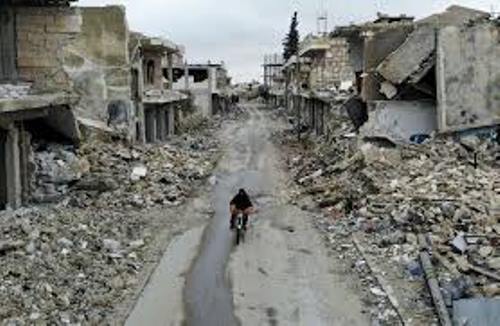The United Nations High Commissioner for Human Rights (UNHCR) is “horrified” by the surge in fighting in northwest Syria and called for humanitarian corridors to assist the largest exodus of civilians since World War II.
Michelle Bachelet on Tuesday also accused the Syrian government and its ally Russia of deliberately targeting civilians and civilian infrastructure.
“No shelter is now safe. And as the government offensive continues and people are forced into smaller and smaller pockets, I fear even more people will be killed,” Bachelet said.
Nearly 300 civilians have been killed in attacks this year in northwest Syria, with 93 percent of the deaths caused by Syrian and Russian forces, she said.
In a statement expressing “horror at the scale of the humanitarian crisis”, Bachelet denounced direct hits on or near camps of displaced civilians, as well as on medical and education facilities, including two hospitals on Monday.
She has previously said such acts could be war crimes.
Syrian army strengthens Aleppo grip before Russia-Turkey talks
Her spokesman Rupert Colville – asked whether Syria and Russia were deliberately targeting civilians and buildings protected under international law – told a Geneva briefing: “The sheer quantity of attacks on hospitals, medical facilities, and schools would suggest they cannot all be accidental.”
Al Jazeera’s Hashem Ahelbarra, reporting from Hatay, Turkey, noted Idlib in Syria’s northwest is home to four million people and the situation was “unprecedented”.
“It remains to be seen whether Syrian President Bashar al-Assad will heed these humanitarian warnings … These people increasingly believe they’ve been betrayed, abandoned by the international community,” he said.
The comments by UN officials came as Syrian troops pressed an offensive on Tuesday on the country’s last major rebel enclave. About 900,000 people have been forced from their homes and shelters in less than three months, leaving huge numbers to sleep rough in the thick of winter.
Children have died of exposure in snow-covered camps and the UN has warned the crisis could worsen if no ceasefire is reached to facilitate the relief effort.
As many as seven children – including a seven-month-old – have died from freezing temperatures recently, an aid group working in Idlib, Hurras Network, said.
“As more civilians desperately seek safety on Syria’s border with Turkey, we’re worried that the death toll will increase given the absolutely inhumane living conditions that women and children are finding themselves in, with sub-zero temperatures, no roof over their heads and no warm clothes,” said charity Save the Children in a statement on Tuesday.
Since the start of February, the displacement figure was a staggering 300,000, he said.
“Over the past four days alone, some 43,000 newly displaced people have fled western Aleppo where fighting has been particularly fierce,” UN spokesman David Swanson told AFP news agency.
The wave is the biggest since the start of the civil war nearly nine years ago. It is the largest exodus of civilians since World War II.
“The biggest humanitarian horror story of the 21st century will only be avoided if Security Council members, and those with influence, overcome individual interests and put a collective stake in humanity first,” UN coordinator Mark Lowcock said on Monday.
Russia, the main foreign broker in Syria, has vetoed countless resolutions on the conflict.
President al-Assad promised on Monday that government forces would press on with their offensive.
“The battle for the liberation of the provinces of Aleppo and Idlib continues, regardless of all the hot air coming out of the north,” al-Assad said, in reference to warnings by Turkey.
In recent weeks, Syrian troops and allied forces backed by Russia have reconquered swathes of Idlib as well as key areas that have secured the strategic M5 highway connecting the country’s four largest cities as well as the entire surroundings of Aleppo city for the first time since 2012.
According to war monitor the Syrian Observatory for Human Rights (SOHR), government forces made new gains in western Aleppo province on Tuesday.
“Regime forces are trying to push towards the Sheikh Barakat mountain,” said Rami Abdel Rahman, the head of the Britain-based organisation.
If they capture the area, government forces will control a vantage point over vast swathes of land in Idlib and Aleppo provinces, including areas where tens of thousands of displaced people live in sprawling camps.













